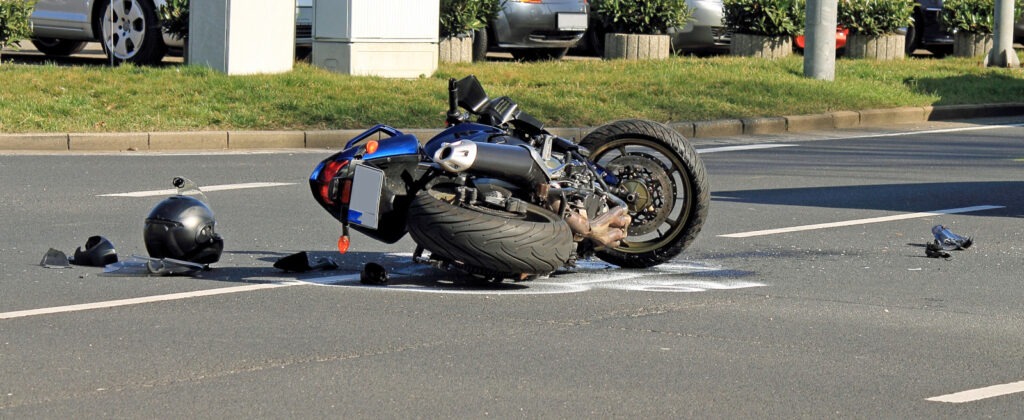 With no surrounding protection, motorcyclists are highly at risk for severe injuries in the event of a collision. In most cases, the other driver is at fault for the accident, which usually involves some form of driver error. Determining fault is a core element of a motorcycle accident lawsuit, and the responsible party’s insurance company pays for the resulting damages. If you suffered injuries or lost someone you love in a motorcycle accident, you deserve financial compensation for your losses and the devastation they caused.
With no surrounding protection, motorcyclists are highly at risk for severe injuries in the event of a collision. In most cases, the other driver is at fault for the accident, which usually involves some form of driver error. Determining fault is a core element of a motorcycle accident lawsuit, and the responsible party’s insurance company pays for the resulting damages. If you suffered injuries or lost someone you love in a motorcycle accident, you deserve financial compensation for your losses and the devastation they caused.
What Are the Common Reasons That Motorcycle Accidents Happen?
Most motorcycle accidents occur because of errors made when judging distance or right of way at an intersection. Motorcyclists often ride in the blind spots of motor vehicles, rendering them invisible to the driver and making left turns precarious. Other common causes include:
- Speeding. Auto accidents of any type can result in significant damages when either party or both parties are speeding. However, given the vulnerable position of a motorcyclist, impact while speeding will likely result in severe losses. The faster a vehicle goes, the more time they need to stop to avoid impact.
- Improper lane changes. Road laws require drivers to thoroughly assess the area surrounding the car and use a turning signal before switching lanes. Making fast lane changes without properly signaling or checking the blind spots could be deadly for a motorcyclist.
- Stopping suddenly. Rear-end accidents are typically the result of tailgating, and in most cases, they are the fault of the driver in the back. When someone on a motorcycle follows too closely, and the car in front stops abruptly, the result is significantly more dangerous for the motorcyclist.
- Poor road conditions. Fallen debris, potholes, cracked or uneven pavement, and missing necessary signage fall under the local government’s responsibility. The longer these dangerous conditions remain on the road, the more likely they will cause an accident. Disabling a motorcycle traveling at any speed could result in severe injuries.
- Lane splitting. Driving between two lanes, especially in heavy traffic, is dangerous and would likely render the motorcyclist at fault if an accident occurs.
- Opening the door of a parked car. Parallel parking on the street is standard, but if drivers open the door to their vehicle and cause an obstruction in an active lane, they could cause serious injury to themselves or another driver. Drivers often overlook motorcyclists, and hitting a door may cause the rider to flip or crash through the car door window.
- Driving while impaired or under the influence. Drugs and alcohol seriously impair a driver’s ability to maintain alertness on the road. Even a single drink of an alcoholic beverage begins to affect cognitive ability and motor function. An impaired driver would face severe consequences in an accident, especially if it were not their first offense.
Sometimes motorcycle accidents happen due to a combination of the causes mentioned above. For example, someone driving under the influence of alcohol may not recognize that they are speeding and would likely fail to check the blind spots properly. A lawsuit could result in serious consequences, including a significant payment of punitive damages.
Common Injuries From Motorcycle Accidents
The most common injuries from a motorcycle accident occur below the waist. Typically, the legs and pelvic area receive the most damage, but injuries to the head and chest are the most dangerous. Some common examples of motorcycle accident injuries include:
- Broken or fractured bones, particularly to the extremities
- Back or spinal cord injuries, sometimes resulting in paralysis or amputation
- Internal organ damage
- Soft tissue damage, such as whiplash, sprains, and strains
- Deep and superficial lacerations
- Bruises and contusions
- Broken and bruised ribs
- Traumatic brain injuries, including a severe concussion and bleeding on the brain
In the absolute worst cases, the accident can result in death. With such possible severe injuries, the at-fault party in an accident is responsible for covering the associated costs. These may include the cost of damaged property, past and future medical treatments, including medications and medical devices, and the value of lost income. Damages may also include intangible losses, such as pain and suffering, emotional distress, disfigurement, and loss of life’s enjoyment.
How Is Fault Determined in a Motorcycle Accident?
At the scene, the police will attempt to determine the cause of the accident and who is at fault. Sometimes the answer is obvious, and sometimes determining who is responsible requires deeper investigation. Either way, the insurance companies will conduct independent investigations to look for further evidence to help them avoid a payout. Similarly, if you hire legal representation, your attorney will investigate to search for evidence that supports your claim.
Both the insurance companies and your attorney will refer to the following to determine fault:
- Statements from the officers that arrived on the scene as well as their reports filed at the station
- Any photographic or video evidence collected in the immediate aftermath of the accident
- Testimonies from eyewitnesses and accident reconstruction specialists
- Video footage from traffic cameras or nearby security cameras
A common tactic of insurance companies and the defense is to claim the plaintiff is either entirely at fault or shares fault with the defendant. If you do share responsibility, the rule of comparative negligence applies.
The comparative negligence rule comes in two forms, pure and modified, and the state decides which one applies to your case. Under pure comparative negligence, the court assigns a percentage of fault to both parties. It then deducts the plaintiff’s share from the compensation award even if the plaintiff is more than 50% at fault. The modified comparative negligence rule follows the same process of deducting a percentage from the reward amount. The difference is that you cannot recover any compensation if you are found more at fault than the other party. A personal injury attorney with experience in motorcycle accidents can help you better understand this process.
Why Should You Contact a Lawyer After a Motorcycle Accident?
As you recover from the pain of a physical injury or the emotional distress of losing a loved one, you should not have to deal with battling insurance companies and complex legal processes. The main benefit of hiring a personal injury lawyer is that they represent you in every aspect of your lawsuit. Some other things a motorcycle accident lawyer takes care of include:
- Negotiating with the insurance company to reach a settlement that best represents the value of your claim
- Conducting an investigation into the accident, often with the help of accident reconstruction experts, to collect evidence that will support your claim
- Ensuring that your claim adequately reflects the value of your losses
- Advocating for your rights throughout the legal process
- Preparing your case for trial if the insurance company does not offer a fair settlement
The physical, emotional, and financial burdens that victims of motorcycle accidents face can be vast. To help alleviate the financial burden, Jason Stone Injury Lawyers require no upfront fee to start working on your case. The first element of the Stone Cold Guarantee ensures we get paid only after you get paid. There’s No Obligation, Just Information. Contact us today for a free case evaluation. We are available and prepared to assist you with your claim and fight for a fair settlement.
Not Trusting What You’re Being Told?
Better Phone Stone
(800) 577-5188
 START MY NO OBLIGATION CONSULTATION
START MY NO OBLIGATION CONSULTATION










